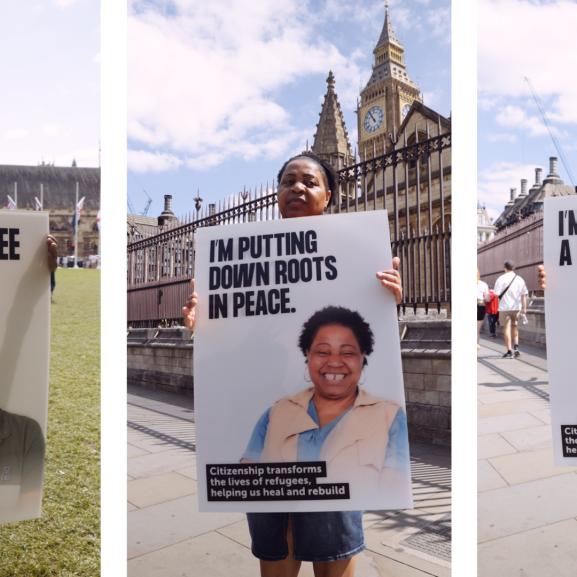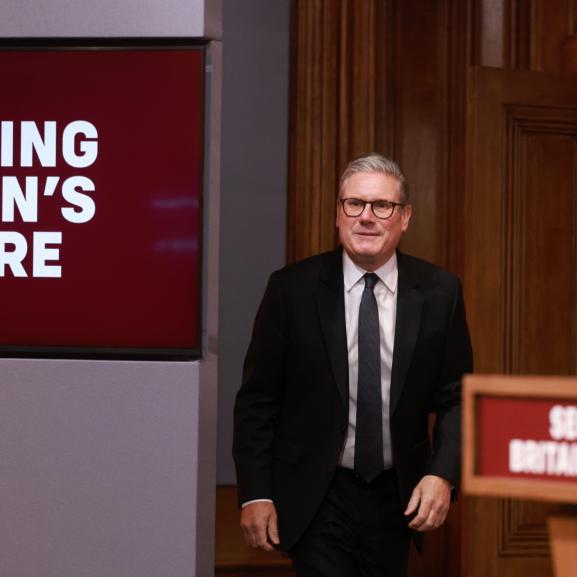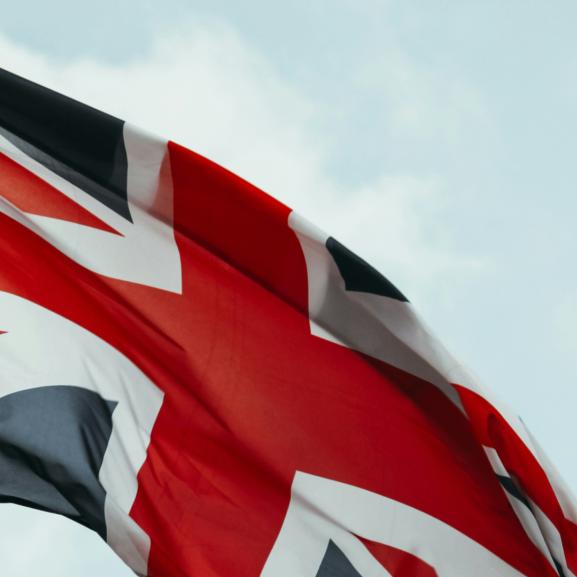Conservatives leave unanswered questions for refused asylum seekers
'Rational discussion' on asylum trumps hysteria, but questions are left unanswered for refused asylum seekers living in limbo. Camilla Jelbart-Mosse blogs about asylum policy at the Conservative Party Conference.
When Damian Green, the Immigration Minister, took to the Conference stage on Tuesday he opened with some political point-scoring against the opposition: "one of Labour's catastrophic failures is immigration. It is important not to rant and rave about immigration – we need to talk calmly but act firmly." Freedom from Torture welcomes the 'rational discussion' approach and reasoned debate on asylum issues was certainly in evidence at the UNHCR, Refugee Council and Still Human Still Here fringe event which Damian Green joined after his speech. (Sadly the same sentiment was not echoed by the Home Secretary on the Human Rights Act when she directly followed him onto the podium in plenary session.) The Refugee Council's Donna Covey later welcomed the change in tone on asylum from the fringe panel - while joking that it had led to a reduction in her own media profile as she was less able to play the "voice of reason when Ministers spoke first and thought later", she said "calm and measured debate saves lives".
For asylum applications involving torture, where too often the decision is 'wrong first time', the UK Border Agency is now piloting improved guidance for decision-makers which we have helped to shape.
In plenary session, the Immigration Minister warned party members not to confuse protection via the UK's asylum system with general immigration before reminding everyone that asylum numbers have fallen dramatically in recent years. He spoke about the thousands of legacy asylum cases which the previous Labour government had uncovered in a warehouse, with individuals left in limbo without a decision for years and promised "I will not let that sort of backlog build up again". Freedom from Torture welcomes the commitment this Minister has also demonstrated to improving the quality of decisions made on asylum claims. As he said in his speech, the goal now is to ensure that decisions are 'right first time'. For asylum applications involving torture, where too often the decision is 'wrong first time', the UK Border Agency is now piloting improved guidance for decision-makers which we have helped to shape.
Is the Refugee Convention "fit for purpose"?
The following fringe meeting was chaired by Gavin Barlow (MP for Croydon, with UKBA's Lunar House in his constituency) who asked the panel members "on its 60th anniversary, is the Refugee Convention still fit for purpose?" The answer was a resounding "yes" from all concerned, though they were quick to get into the many challenges faced in protecting refugees and problems identified within the UK asylum system.
Nicola Blackwood MP, active on refugee issues as a member of the Home Affairs Select Committee and because Campsfield Immigration Removal Centre is in her constituency, delivered a withering précis of persistent concerns within the detention system, drawing on the hopelessness expressed by detainees held indefinitely whom she has met: "even our prisoners we tell when we will let them out of detention". She identified two specific problems from her perspective within the detention system: firstly, excessive transfer of detainees within the system, resulting in lost property, increased bureaucracy and, most importantly, severed links with medical and legal staff which need to be re-built in new environments. Secondly, the detention of torture survivors, including the chronic failure of the "Rule 35" mechanism which is supposed to identify survivors for release from detention in accordance with UKBA's own policy which is not to detain torture survivors except in 'very exceptional cases'. Blackwood said, "if there is any group of refugees which we should be treating with extreme care, it is those whom a doctor has identified as having escaped torture".
She drew attention to the upcoming Home Affairs committee inquiry into the asylum system and emphasised that the public debates around immigration and asylum issues must not be conflated – something this Government has been careful about and a point which Damian Green reiterated when it was his turn to speak.
Green reflected that when UNHCR was set up in 1950 it was given a three-year mandate to do its work – and then disband. If only the world's refugee issues could have been solved in the three years! He spoke about the work he is doing to improve the UK Border Agency's handling of asylum cases with decisions made correctly and quickly – reiterating that the Agency's informal motto now is "right first time, every time".
Covey warned starkly of the impact of legal aid cuts on those navigating the asylum system and expressed concern around the Government's continued commitment to detaining people for 'administrative convenience' using the Detained Fast Track system.
Donna Covey of the Refugee Council emphasised that the biggest challenges for the agency are cultural issues – including the ingrained "culture of disbelief" which is still in evidence. She said the Agency's decision-making is still disproportionately focused on credibility, so that it is left to the Tribunal to focus on fact. Covey warned starkly of the impact of legal aid cuts on those navigating the asylum system and expressed concern around the Government's continued commitment to detaining people for 'administrative convenience' using the Detained Fast Track system.
Freedom from Torture thanked the Minister for his leadership in strengthening guidance for UK Border Agency decision-makers on how to handle our medico legal reports when they assess claims involving torture, but – picking up where Nicola Blackwood MP left off – we told him that we are still struggling to ensure torture survivors are not detained. We sought his help in ensuring that policies around suitability for the Detained Fast Track system are revisited so that survivors can be screened out before they are swept up in this system. He said that the Agency cannot make it too easy for people to be able to avoid detention just by claiming they have been tortured, but agreed that 'it is important to keep the evidential requirements under review'. He said 'it is reasonable to ask UKBA to do that and we will'. We look forward to following this up with his officials!
There is an "unhealthy grey area" in which large numbers of individuals are refused asylum but cannot be returned to their countries of origin due to ongoing violence and other problems and can live for years in the UK on minimal benefits, with no right to work.
Roland Schilling, UNHCR's representative to the UK, remarked wisely that "Home Affairs statements have an export value" and a previous Immigration Minister's ill-thought through remarks that the Refugee Convention was a "dated instrument" had been picked up around the world by governments not known for their commitment to human rights protection. He deemed the UK system "partly fit for purpose" – praising the UK's engagement in helping other countries and piloting new projects – but said that there needs to be more precision in decision-making, particularly for those who have fled civil war and conflict.
There is an "unhealthy grey area" in which large numbers of individuals are refused asylum but cannot be returned to their countries of origin due to ongoing violence and other problems and can live for years in the UK on minimal benefits, with no right to work. Further along the panel table, Joelle, from the Hounslow African Refugee Association, gave an impassioned plea for the UK government to reform the circumstances those living in this limbo bracket must endure, including converting the "Azure Card" weekly allowance to cash payments "just like any other benefit in the UK", to help allow refused asylum seekers to live with dignity. In their current situation, those on Azure Cards cannot save more than £5 of their £35.37 weekly payment at any one time, making it impossible to buy goods like school uniforms for children.
Sadly, Joelle's plea was not answered by the Immigration Minister on the panel - perhaps she should have been introduced to speak earlier so that the Minister would have been forced to answer her calls





